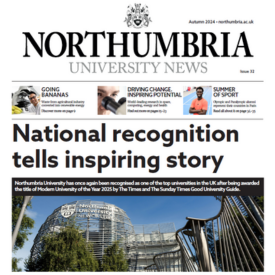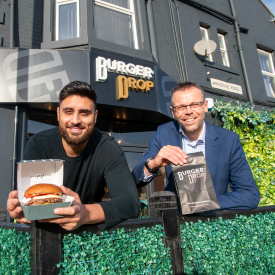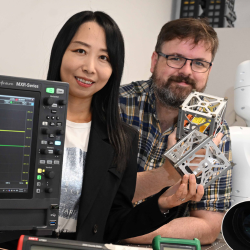-
Study
-
Undergraduate
- Search for a Course
- Undergraduate Open Day & Events
- Application Guides
- Northumbria University UCAS Exhibitions
- Foundation Years
- Undergraduate Fees & Funding
- School & College Outreach
- Continuing Professional Development
-
Postgraduate
- Postgraduate Study Degree
- Postgraduate Research Degrees
- Postgraduate Open Days and Events
- Postgraduate Fees & Funding
- Flexible Learning
- Thinking about a Masters?
- Continuing Professional Development
- Change Direction
-
Student Life
- The Hub - Student Blog
- Accommodation
- Life in Newcastle
- Support for Students
- Careers
- Information for Parents
- Students' Union
- Northumbria Sport
- Be Part of It
-
-
International
International
Northumbria’s global footprint touches every continent across the world, through our global partnerships across 17 institutions in 10 countries, to our 277,000 strong alumni community and 150 recruitment partners – we prepare our students for the challenges of tomorrow. Discover more about how to join Northumbria’s global family or our partnerships.
View our Global Footprint-
Applying to Northumbria
- European Union
- Our London Campus
- Northumbria Pathway
- International Events
- Entry Requirements and Country Representatives
- Regional Offices
-
Northumbria Language Centre
- Faculty Requirements
- Acceptable English Requirements
- Pre-sessional English Language and Study Skills
- Academic Language Skills Programmes (ALS)
-
International Fees, Funding & Scholarships
- International Undergraduate Fees
- International Undergraduate Funding
- International Masters Fees
- International Masters Funding
- International Postgraduate Research Fees
- International Postgraduate Research Funding
- International Money Matters
-
Life at Northumbria
- International student support
- Careers
-
International Mobility
- Current Northumbria Students
- Incoming Exchange Students
-
-
Business
Business
The world is changing faster than ever before. The future is there to be won by organisations who find ways to turn today's possibilities into tomorrows competitive edge. In a connected world, collaboration can be the key to success.
More on our Business Services -
Research
Research
Northumbria is a research-rich, business-focused, professional university with a global reputation for academic quality. We conduct ground-breaking research that is responsive to the science & technology, health & well being, economic and social and arts & cultural needs for the communities
Discover more about our Research -
About Us
-
About Northumbria
- Our Strategy
- Our Staff
- Place and Partnerships
- Student Profiles
- Alumni Profiles
- Leadership & Governance
- Academic Departments
- University Services
- History of Northumbria
- Contact us
- Online Shop
-
-
Alumni
Alumni
Northumbria University is renowned for the calibre of its business-ready graduates. Our alumni network has over 244,000 graduates based in 178 countries worldwide in a range of sectors, our alumni are making a real impact on the world.
Our Alumni - Work For Us
What will I learn on this module?
Sound and Post Production 1 aims to introduce you to the considerations and definitions surrounding sound and post production in film production.
Sound is an often overlooked aspect of film production, but it is a powerful tool in adding resonance to productions and also needs to be technically precise.
This introductory module looks at the place of sound in your understanding of film projects, it covers technical sound theory and engages with the practicalities of effective sound recording and basic mixing.
Editing is one of the key skills in delivering projects and this module introduces you to non-linear editing platforms, in workshops that include the architecture of the platforms, workflows, basic editing techniques and delivery formats.
You will make a ‘soundscape’ to discover the potential of sound and also attend editing workshops to become conversant with the processes of editing.
How will I learn on this module?
You will learn about the subject through lectures and technical demonstrations
The lectures and technical sessions will enable the tutor to discuss the key components of sound and post, in this context. Technical demonstrators will introduce you to the basic technology of sound and post production.
The technical sessions will be structured to reflect the core issues and themes of the module. Your tutor will frame the content of each session and outline the aim and outcomes. Tutors begin the sessions by outlining clear parameters, defining the considerations that will enable you to develop your practical work while also developing a critical understanding of principles needed to deliver effective productions. Every module is underpinned by a strong conceptual foundation. The module aims to help you to develop your skills by applying those critical concepts to your own practice. The sessions help to guide you through that development by offering formative feedback as you work through the materials and processes. Guided project work creates an experiential environment on which tutors offer insight.
Outside of the taught sessions, you will be expected to engage with module-relevant reading in preparation for the sessions. An electronic reading list is supplied via the e-Learning Portal, which will guide you towards appropriate resources, although you are encouraged to explore the wider library catalogue to engage with additional sources too. During your independent working time, it is also expected that you will apply the ideas raised in the reading and the taught content to film examples of your own choosing (reflecting your individual interests), and to your own practice.
Lecture materials, seminar guidelines and module information will be placed upon the e-Learning Portal.
How will I be supported academically on this module?
Developing the precise technical skills to deliver film and TV projects must be placed in a contextual and creative framework in order to add value to your learning, and the lecture/workshop delivery of this module is designed to do this. An Avid (video and audio production technology) test, following in depth technical training, gives you the confidence to operate editing platforms expertly while the lectures provide you with the considerations, approaches and philosophy that underpin best practice in the subject area. In testing you individually, you are prepared for deeper engagement with editing platforms.
The ‘soundscape’ project approaches the world of audio through workshops in the science of sound and basic recording and mixing. This is a creative project contextualised through lectures and you will receive verbal feedback as you perform exercises in the workshops and in discussion about the ‘soundscape’ production. There will be the opportunity to present a draft version of your projects for peer review and formative feedback in class.
You will then receive written feedback on your final summative submissions which will detail areas that could be improved in future work. You will also be offered the opportunity to receive further verbal feedback, following this formal assessment, so that they can follow up any concerns you have regarding your critical development and future learning. Where appropriate you may also be directed to engage with our Skills Plus or other resources offered through the University Student Support Services such as Dyslexia Support. Guidance tutorials also provide opportunities for students to discuss, in confidence, their academic progress on the programme.
What will I be expected to read on this module?
All modules at Northumbria include a range of reading materials that students are expected to engage with. Online reading lists (provided after enrolment) give you access to your reading material for your modules. The Library works in partnership with your module tutors to ensure you have access to the material that you need.
What will I be expected to achieve?
Knowledge & Understanding:
1. Understand the basic key components that make up sound and post production practice
2. Understand the creative and critical context of sound and post production practice
Intellectual / Professional skills & abilities:
3. Show how creative and critical contexts underpin practice in the production of the ‘soundscape’.
4. Evidence technical skills in performing industry standard operation of the Avid platform including audio recording and mixing skills
5. Develop confidence in dealing with sound and post production technology to explore ideas
Personal Values Attributes (Global / Cultural awareness, Ethics, Curiosity) (PVA):
How will I be assessed?
Summative assessments will test skills of post production operation, sound recording and basic mixing as well as creative and critical understanding of the place of sound in creating imaginative sonic environments without image – all MLOs.
The post production skills are measured with a technical operation exam (1 hour) worth 40%. This in class test is modelled on the Avid Certification test and prepares you to go on to take the exam to achieve Avid Certification - MLOs 1, 3 and 4.
The sound skills are measured through the delivery of a practical portfolio of work in the form of a ‘soundscape’ incorporating the recording of sound giving objects and sound effects into a manipulated timeline to create ‘atmosphere’ in answer to a brief worth 60% - all MLOs addressed here.
Pre-requisite(s)
None
Co-requisite(s)
None
Module abstract
Sound is the ‘Cinderella of Filmmaking’, often neglected and left as an afterthought - but it can be up to 70% of our experience of Film and TV productions. Francis Ford Coppola says that ‘The essence of cinema is editing…images put together in a kind of alchemy’ and here you are introduced to the considerations and definitions that surround sound and post production. You will explore the place of sound in your understanding as a creative tool, as well as one that needs to be technically precise. You will be introduced to Avid non-linear editing, by certified instructors, in preparation for you to gain the Avid certificate. This module lays the sound and post foundation and you will gain competencies and confidence in dealing with this essential part of making great films and TV productions.
Course info
UCAS Code P310
Credits 20
Level of Study Undergraduate
Mode of Study 3 years Full Time or 4 years with a placement (sandwich)/study abroad
Department Arts
Location City Campus, Northumbria University
City Newcastle
All information is accurate at the time of sharing.
Full time Courses are primarily delivered via on-campus face to face learning but could include elements of online learning. Most courses run as planned and as promoted on our website and via our marketing materials, but if there are any substantial changes (as determined by the Competition and Markets Authority) to a course or there is the potential that course may be withdrawn, we will notify all affected applicants as soon as possible with advice and guidance regarding their options. It is also important to be aware that optional modules listed on course pages may be subject to change depending on uptake numbers each year.
Contact time is subject to increase or decrease in line with possible restrictions imposed by the government or the University in the interest of maintaining the health and safety and wellbeing of students, staff, and visitors if this is deemed necessary in future.
Useful Links
Find out about our distinctive approach at
www.northumbria.ac.uk/exp
Admissions Terms and Conditions
northumbria.ac.uk/terms
Fees and Funding
northumbria.ac.uk/fees
Admissions Policy
northumbria.ac.uk/adpolicy
Admissions Complaints Policy
northumbria.ac.uk/complaints














